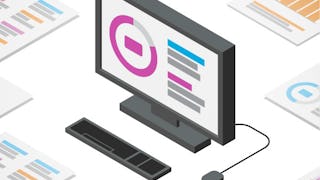Der Kurs baut auf meinem Kurs Einführung in die Finanzbuchhaltung auf, den Sie zuerst absolvieren sollten. In diesem Kurs lernen Sie, wie Sie die meisten Informationen, die Unternehmen in ihren Jahresabschlüssen bereitstellen, lesen, verstehen und analysieren können. Diese Fähigkeiten werden Ihnen helfen, fundiertere Entscheidungen auf der Grundlage von Finanzinformationen zu treffen.


Mehr Einführung in die Finanzbuchhaltung
Dieser Kurs ist Teil von Spezialisierung für Einführung in das Finanz- und Rechnungswesen

Dozent: Brian J Bushee
66.707 bereits angemeldet
Bei enthalten
(557 Bewertungen)
Kompetenzen, die Sie erwerben
- Kategorie: Aktien
- Kategorie: Steuer
- Kategorie: Finanzielle Analyse
- Kategorie: Finanzbuchhaltung
- Kategorie: Finanzberichte
- Kategorie: Finanzielle Berichterstattung
- Kategorie: Cashflows
- Kategorie: Bilanz
- Kategorie: Buchhaltung
- Kategorie: Bilanzanalyse
- Kategorie: Anlagevermögen
- Kategorie: Gewinn- und Verlustrechnung
- Kategorie: Debitoren
- Kategorie: Vorratsbuchhaltung
- Kategorie: Abschreibung
Wichtige Details

Zu Ihrem LinkedIn-Profil hinzufügen
13 Aufgaben
Erfahren Sie, wie Mitarbeiter führender Unternehmen gefragte Kompetenzen erwerben.

Erweitern Sie Ihre Fachkenntnisse
- Lernen Sie neue Konzepte von Branchenexperten
- Gewinnen Sie ein Grundverständnis bestimmter Themen oder Tools
- Erwerben Sie berufsrelevante Kompetenzen durch praktische Projekte
- Erwerben Sie ein Berufszertifikat zur Vorlage

In diesem Kurs gibt es 6 Module
Jetzt, da wir die Grundlagen aus dem Kurs Einführung in die Finanzbuchhaltung kennen, werden wir uns durch die Bilanz arbeiten und die verschiedenen Arten von Aktiva, Passiva und Eigenkapital (zusammen mit den dazugehörigen Einnahmen und Ausgaben) genauer besprechen. Wir beginnen mit den Forderungen aus Lieferungen und Leistungen und dem Problem, dass einige Kunden, die Waren auf Kredit kaufen, uns nicht bezahlen werden. Wir werden uns mit der Berechnung, Offenlegung und Analyse solcher "uneinbringlichen Forderungen" befassen. Wir werden auch kurz auf andere Themen der Debitorenbuchhaltung wie Factoring und Verbriefung eingehen. Anschließend gehen wir zu den Vorräten über. Wir werden erörtern, wie sich die Bilanzierung von Vorräten bei Einzelhandels- und Produktionsunternehmen unterscheidet. Wir werden sehen, wie Unternehmen die Kosten der verkauften Vorräte ermitteln, was Annahmen über Kostenflüsse erfordert. Diese Diskussion wird uns zu einem der berüchtigtsten Themen der Buchhaltung führen: LIFO.
Das ist alles enthalten
8 Videos1 Lektüre2 Aufgaben
Diese Woche werden wir uns mit Vermögenswerten beschäftigen, die längerfristige Investitionen darstellen. Wir beginnen mit Sachanlagen und behandeln Fragen wie: Was wird in diesen Konten verbucht? Wie werden sie abgeschrieben? Was geschieht, wenn ihr Wert gemindert ist? Anschließend werden wir ähnliche Fragen zu immateriellen Vermögenswerten, einschließlich Goodwill, behandeln. Schließlich werden wir erörtern, wie Unternehmen Investitionen in Schuldverschreibungen und Aktien bilanzieren und wie die Behandlung von Kapitalbeteiligungen an anderen Unternehmen davon abhängt, wie viele Anteile an dem anderen Unternehmen gehalten werden.
Das ist alles enthalten
8 Videos2 Aufgaben
In dieser Woche wenden wir uns der rechten Seite der Bilanz zu und werfen einen Blick auf die Passiva. Zunächst werden wir uns mit dem Zeitwert des Geldes befassen, d.h. mit der Vorstellung, dass 1 $ heute nicht dasselbe wert ist wie 1 $ in der Zukunft. Bei fast allen Verbindlichkeiten muss der Zeitwert des Geldes berücksichtigt werden, so dass dies eine wichtige Grundlage für Ihr Verständnis ist. Danach werden wir uns mit der Bilanzierung von Bankschulden, Hypotheken und Anleihen beschäftigen. Als Nächstes werden wir uns mit dem Thema "außerbilanzielle" Verbindlichkeiten befassen und dabei das Thema Leasing besprechen.
Das ist alles enthalten
7 Videos2 Aufgaben
Es gibt zwei Gewissheiten im Leben, und eine davon werden wir diese Woche behandeln (die andere würde den Rahmen des Kurses sprengen). Wir werden Ihnen NICHT beibringen, wie Sie Ihre eigene Steuererklärung erstellen. Stattdessen werden wir besprechen, wie Unternehmen "zwei Arten von Büchern" erstellen müssen: ihre Jahresabschlüsse und ihre Steuererklärungen. Für diese beiden Bücher gelten unterschiedliche Regeln, die zu permanenten und temporären Differenzen führen. Wir werden beide Arten von Unterschieden behandeln, wobei der Schwerpunkt auf "latenten Steuern" liegt, die das Nebenprodukt von temporären oder zeitlichen Unterschieden zwischen der Steuer- und der Finanzberichterstattung sind. Schließlich werden wir auch andere Steuerthemen ansprechen, wie z.B. Verlustvorträge und die Vorschrift, nach der Unternehmen offenlegen müssen, in welchem Umfang sie versuchen, Steuern zu hinterziehen (Entschuldigung, es sollte heißen "Steuerplanungsstrategien anzuwenden, um ihr steuerpflichtiges Einkommen zu steuern").
Das ist alles enthalten
7 Videos2 Aufgaben
Unsere letzte Woche mit neuem Material endet am Ende der Bilanz: Das Eigenkapital. Wir werden über die Ausgabe von Aktien, den Rückkauf von Aktien, eigene Aktien, Aktiendividenden und -splits, das kumulierte sonstige Gesamtergebnis und die aktienbasierte Vergütung sprechen. Schließlich werden wir auch den vierten vorgeschriebenen Finanzbericht behandeln: Den Eigenkapitalnachweis (Statement of Stockholders' Equity).
Das ist alles enthalten
7 Videos2 Aufgaben
In den Videos dieser Woche gehe ich eine systematische Bilanzanalyse für ein Unternehmen durch. Für dieses Material gibt es keine Hausaufgaben und es wird auch nicht explizit in der Prüfung behandelt (obwohl einige der Konzepte eine Wiederholung von Material sind, das wir zuvor behandelt haben). Wenn Sie also vor der Abschlussprüfung keine Zeit haben, können Sie sich diese Videos auch nach der Prüfung ansehen, ohne dass sich dies negativ auf Ihre Leistung auswirkt. Die Abschlussprüfung deckt den Stoff der Wochen 5 bis 9 ab. Das Einzige, was Sie nach dieser Prüfung noch tun müssen, ist, Ihre Familie, Freunde und Kollegen mit Ihrem umfangreichen Wissen über Finanzbuchhaltung zu beeindrucken!
Das ist alles enthalten
5 Videos3 Aufgaben
Erwerben Sie ein Karrierezertifikat.
Fügen Sie dieses Zeugnis Ihrem LinkedIn-Profil, Lebenslauf oder CV hinzu. Teilen Sie sie in Social Media und in Ihrer Leistungsbeurteilung.
Dozent

Mehr von Finanzen entdecken
 Status: Kostenloser Testzeitraum
Status: Kostenloser TestzeitraumFundação Instituto de Administração
 Status: Kostenloser Testzeitraum
Status: Kostenloser TestzeitraumUniversity of Pennsylvania
 Status: Vorschau
Status: VorschauPolitecnico di Milano
 Status: Kostenloser Testzeitraum
Status: Kostenloser TestzeitraumUniversity of California, Irvine
Warum entscheiden sich Menschen für Coursera für ihre Karriere?




Bewertungen von Lernenden
557 Bewertungen
- 5 stars
87,97 %
- 4 stars
8,07 %
- 3 stars
1,79 %
- 2 stars
0,71 %
- 1 star
1,43 %
Zeigt 3 von 557 an
Geprüft am 11. Juni 2020
Professor Brian Bushee explains the concepts in a comprehensible and humorous manner! The course wouldn't be fun without the animated students :)
Geprüft am 29. Juli 2020
More advanced content, and a perfect complementary course with the Introduction to Financial Accounting. I highly recomment this course.
Geprüft am 12. Feb. 2018
This entire course was very well done. I liked the professor and his virtual students. They asked (for the most part) relevant questions that added to my understanding.

Neue Karrieremöglichkeiten mit Coursera Plus
Unbegrenzter Zugang zu 10,000+ Weltklasse-Kursen, praktischen Projekten und berufsqualifizierenden Zertifikatsprogrammen - alles in Ihrem Abonnement enthalten
Bringen Sie Ihre Karriere mit einem Online-Abschluss voran.
Erwerben Sie einen Abschluss von erstklassigen Universitäten – 100 % online
Schließen Sie sich mehr als 3.400 Unternehmen in aller Welt an, die sich für Coursera for Business entschieden haben.
Schulen Sie Ihre Mitarbeiter*innen, um sich in der digitalen Wirtschaft zu behaupten.
Häufig gestellte Fragen
Um Zugang zu den Kursmaterialien und Aufgaben zu erhalten und um ein Zertifikat zu erwerben, müssen Sie die Zertifikatserfahrung erwerben, wenn Sie sich für einen Kurs anmelden. Sie können stattdessen eine kostenlose Testversion ausprobieren oder finanzielle Unterstützung beantragen. Der Kurs kann stattdessen die Option "Vollständiger Kurs, kein Zertifikat" anbieten. Mit dieser Option können Sie alle Kursmaterialien einsehen, die erforderlichen Bewertungen abgeben und eine Abschlussnote erhalten. Dies bedeutet auch, dass Sie kein Zertifikat erwerben können.
Wenn Sie sich für den Kurs einschreiben, erhalten Sie Zugang zu allen Kursen der Spezialisierung, und Sie erhalten ein Zertifikat, wenn Sie die Arbeit abgeschlossen haben. Ihr elektronisches Zertifikat wird Ihrer Seite "Leistungen" hinzugefügt - von dort aus können Sie Ihr Zertifikat ausdrucken oder Ihrem LinkedIn-Profil hinzufügen.
Ja. Für ausgewählte Lernprogramme können Sie eine finanzielle Unterstützung oder ein Stipendium beantragen, wenn Sie die Anmeldungsgebühr nicht aufbringen können. Wenn für das von Ihnen gewählte Lernprogramm eine finanzielle Unterstützung oder ein Stipendium verfügbar ist, finden Sie auf der Beschreibungsseite einen Link zur Beantragung.
Weitere Fragen
Finanzielle Unterstützung verfügbar,

